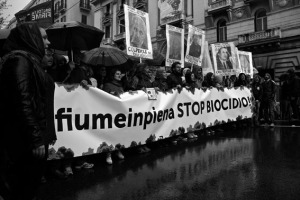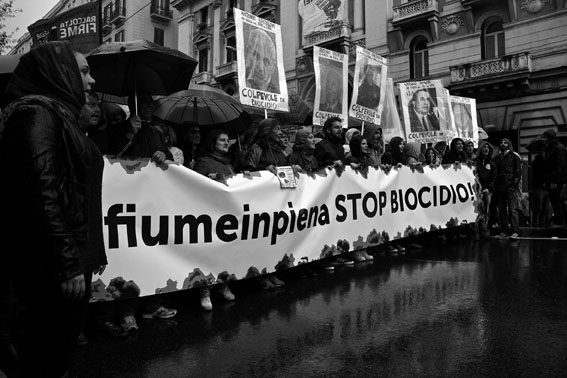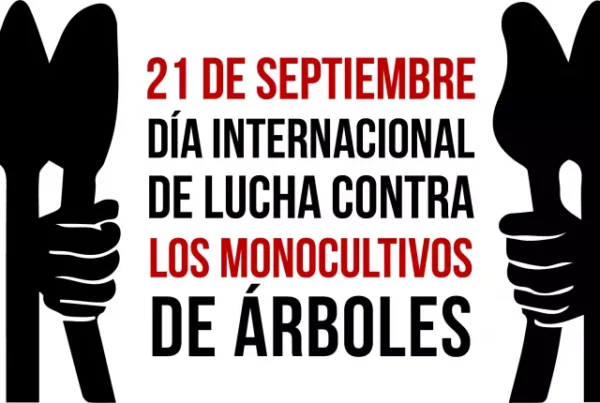by Giorgos Velegrakis
The interview was originally given to Giorgos Velegrakis for the greek environmental magazine Oikotrives
Giorgos Velegrakis (G.V.): We know that over a lot of years now an area of Campania became the trashcan of Italy. How did it all start?
Salvatore Paolo De Rosa (S.P.):The area of Campania that suffered the most of the accumulation of trash is the northern part: a plain between the provinces of Naples and Caserta, stretching on 3.800 sq. km whit 4 million inhabitants. This land was known in the past as “Campania Felix”, Happy Campania, for the fertility of the soil and the quality of the yields. The transformation into a trashcan has been a slow process of waste colonization, unfolded through the “urban waste emergency” of the years 1994-2009 and the illegal disposal of hazardous waste, since the beginning of 90s until today. However, the roots of the disaster are deeply embedded in the ways economic development and urbanization have been managed in the last sixty years. Spatial planning here was shaped by the freehand initiative of economic elites with political ties, often indistinguishable from mafia groups turned into armed entrepreneurs. Given this context, the flows of waste in Campania have not only been a socio-environmental disaster for the many, but also an opportunity of huge profits for the few.
During the “emergency”, the government entrusted the urban waste cycle to a private company. Its project entailed the processing of the entire amount of Campania’s urban waste in seven plants for the production of Refused Derived Fuel and the construction of two waste-to-energy plants. It was granted very favourable conditions: the right to accumulate the waste blocks and the possibility to choose the locations of the waste facilities without any prior public consultation. These elements are of prominent importance for understanding the recurrent flooding of trash in the streets and the social unrest against the government. Indeed, the company’s interest in accumulating as much trash as possible resulted in the clogging of the waste cycle and in the need to open up new waste storage sites. For the company, more trash to burn meant more money to collect, thanks to the public subsidies granted to energy production from waste incineration. While urban garbage piled up, a network of industrial entrepreneurs, public officers and mafia groups was already filling any available hole with dangerous materials. According to police investigations, since the ‘90s, millions of tons of hazardous waste arrived to Campania every year from Northern Italy and Europe and were dumped without the most basic environmental safeguards. In this business, industries’ desire to get rid of the by-products from their activities at lower costs merged with the predatory economic behaviour of criminal organizations. The wild disposal thus allowed legal as well as illegal businesses to socialize the costs of production while privatizing the profits.
G.V.: What is the current situation concerning the waste management in the area? What are the specific consequences?
S.P.: Urban waste management is still fragile and it threatens to collapse into chaos at the slightest malfunction of the cycle. Today, the municipality of Naples pays to send a fraction of its urban waste to Holland and it performs poorly in terms of recycling. Smaller municipalities have implemented good rates of garbage recycling, even though they still lack an effective network of facilities for the processing of the biological fraction. The heritage of the emergency are between 6 and 7 million tons of waste blocks scattered into “temporary” storage sites. Plans for new incinerators are still a matter of conflict. On the side of illegal trafficking, a specific law has recently addressed the phenomenon, even though with great delay.
The main consequences for the people come from the risks of contamination. The pollutants from waste are transiting to the food chain and to the local biota, spreading fear about what people eat and breathe. Several scientific studies connect the unusual cancer rates of specific places to the waste pollution. Moreover, the exclusion from negotiations created a sense of powerlessness in the people, for whom the trust in the government institutions is close to zero. The big issue right now is the need of land remediation, which thanks to social mobilizations has been acknowledged by the government.
G.V.: We also know that there is a connection between urban waste disposal and (illegal) toxic wastes disposal. Is that true?
S.P.: Police investigations showed that the urban waste emergency has actually favored some of the actors dealing with the illegal trafficking of toxic waste. Legal owners of landfills and sand quarries were able to dispose illegally hazardous materials in their facilities while working with the government for accommodating urban waste during the peaks of emergency. In this way, they gained profits two times. State institutions thus carry a great responsibility for the degradation of Campania’s ecosystem. Their main responsibility has been to favor primarily private interests over collective ones. The decision of providing public subsidies for the energy produced by waste incineration has proved to be the main cause behind the company’s attempt to accumulate as much trash as possible. On the other hand, the never-ending derogations from ordinary laws paved the way for Campania’s environmental degradation.
G.V.: On the other hand we have a very strong grassroots movement. Which are the demands, what are their practices, their social alliances and how did they built them?
S.P.: Citizens organized in grassroots committees and associations primarily as local efforts to defend their livelihoods. These people belong to the municipalities targeted by the government’s waste management plans and live in areas affected by the illegal disposal. They rarely call themselves environmentalists: the threats to the environment are rather perceived as a personal issue concerning the right to health and to a safe life. With the time, committees emerged in the wake of a single protest, became permanent political subjects, improving connections with other movements engaged in the defense of territories. Today, all popular movements of Campania are trying to confederate themselves into one social movement. The basic demands they articulate are the request of real democracy, the inclusion of communities into negotiations affecting their life, a political and economic turn toward zero waste management policies and economic resources to provide primary health prevention and land remediation under popular control.
G.V.: So, in Campania we have a so-called “waste war”. Do you think that this situation and especially the grassroots initiatives change the space of politics? In what ways?
S.P.: I think social movements of Campania are at the forefront of the current global clash between economic rapacity and socio-environmental sustainability. A part from using the classic means of political action, Campania’s activists are developing a new politics that moves from the defense of livelihoods to achieve the physical and symbolic re-appropriation of the territories. By learning the interdependence of ecological, political and economic dimensions of society throughout the years of “waste wars”, social movements understood the need to improve their control on the forms of development imposed on the local community by homogenizing capitalist relations. Positing the commons as a barrier to further exploitation, they are fighting waste contamination by establishing social cooperatives and pedagogical initiatives, building bottom up institutions that the state cannot ignore anymore.






6 Comments